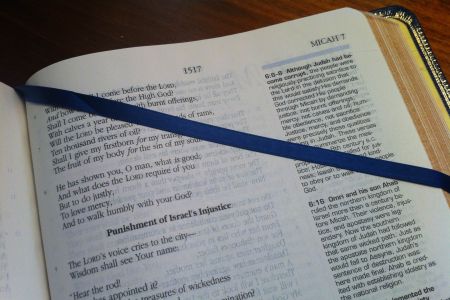
Some of us like to keep things simple. “Just tell me what to do, and I’ll do it.” Especially if we’ve messed up, we want a list showing us how to fix what’s broken. One, two, three. Check off each one, and we’re done.
God gave his people a short to-do list like that, tucked among the pages of Micah—a small book full of big themes. Big, bad themes, actually. The coming judgment. Weeping and mourning. False prophets and dishonest leaders. Guilt and punishment. Misery and desolation.
Oh dear. Hard to believe we plucked a favorite verse out of all that. But we did.
Is there any good news in this post? Any hope of redemption? Count on it. In the meantime, to quote Bette Davis in All About Eve, “Fasten your seatbelts. It’s going to be a bumpy night.”

“He has shown you, O mortal, what is good.
And what does the Lord require of you?
To act justly and to love mercy
and to walk humbly with your God.” Micah 6:8
In the 8th century B.C., “The word of the Lord…came to Micah” (Micah 1:1), a minor prophet from Moresheth in the hill country south of Jerusalem.
The role of a prophet is to speak God’s truth, even when it hurts, and it usually does. When Micah prophesied, idolatry was rampant, spiritual lethargy was pandemic, and justice and fairness were nowhere to be found.
Sound familiar?
At the start of this chapter, God takes the bench, gavel in hand: “For the Lord has a case against his people; he is lodging a charge against Israel” (Micah 6:2). After the charges are outlined, the chapter ends with a stiff sentence: “Therefore I will give you over to ruin and your people to derision” (Micah 6:16).

Our verse this week is a stern reminder of what God’s people were supposed to be doing, but weren’t. Let’s see if our generation is doing any better.
He has shown you,…
Yes, he certainly has shown us. Throughout Scripture, God has “made it plain” (MSG) what he expects of us. We have “already been told” (CJB). We are without excuse.
Nonetheless, I keep making excuses.
Lord, I would do more for others, if I had enough energy to spare.
Lord, I would be more generous, if I could be sure where the money goes.
Lord, I would spend more time in your presence, if I wasn’t so busy.
And on and on and on. Groan.
…O mortal,…
That’s a phrase we don’t toss around very much. O mortal. In the Bible it’s seldom used as a compliment, since “God is greater than any mortal” (Job 33:12). Job gives mortals a sound thrashing, describing us as “full of trouble” (14:1), “vile and corrupt” (15:16), “a maggot—a human being, who is only a worm!” (25:6). Eww.
Unlike our immortal God, mortals are “men and women” (MSG) who will die. God declares, “Return to dust, you mortals” (Psalm 90:3). Our mortality, our fragility, our finality—all are abundantly clear.

God is not-so-gently reminding us that the life of mortals is “like grass…the wind blows over it and it is gone, and its place remembers it no more” (Psalm 103:15-16). See those gravestones? Can you read the names? Right. No more.
…what is good.
That’s what God has shown us: “what goodness is” (ERV), “what is good in His sight” (VOICE). Not good by our definition; good by God’s definition.
My standard of “what is good” is all over the map. I compare one behavior to another, instead of comparing everything I do with God’s goodness. I end up with actions that are “pretty good” and “not so good” and “kinda good” and “good enough.”
No, Liz. Good is what God says is good: himself.
In fact, Jesus said, “No one is good—except God alone” (Mark 10:18).
Why do we insist on making up our own rules, when God has already laid down the Law?
And what does the Lord require of you?
This is where we really get in trouble. We prefer to go with the bare minimum. That’s what the Israelites were doing during Micah’s time: asking for the cut-to-the-chase list of “what Adonai demands” (CJB), “what the Lord really wants” (NET). We’re right there with them: we want to know “how to live, what to do, what God is looking for” (MSG).
As long as his requirements are manageable. As long as we don’t actually have to change…

To act justly…
That’s the first of the three items on God’s list. “See that justice is done” (CEV), he tells us. “Be fair to other people” (ERV). “Do what is right” (NLV).
Sounds easy enough. Be fair, play nice, do random acts of kindness. Is that it?
No. We need to think bigger. Think broader. Think how to “promote justice” (NET) in every corner of the world we touch. Some people I know excel at this. They volunteer, they give away their time and talents and resources, they reach out to the least of these, and find themselves touching the hem of Christ’s garment.
When we worry about everybody getting a share, instead of making sure we keep our share, we show the world a God who loves the poor and lifts up the humble and embraces the broken. We show them Jesus.
I would give myself no better than a C- for “act justly.” I have so far to go. Embarrassingly far.
…and to love mercy…
I’m breathing easier on this one. “Love grace” (CJB)? You bet. “Love being kind to others” (EXB)? With all my heart. “Let mercy be your first concern” (CEV)? I’m in, let’s go.
Except my willingness to extend mercy, grace, kindness, and compassion to others eventually runs out. Like a switch being flicked off, I’m suddenly out of juice. Out of patience, out of energy, out of time.
The Word says, “You must love others faithfully” (NIRV), but I say, “Can I pass on this one, Lord? Can you find someone else to love her? Someone who isn’t weary of doing good?”
Some days I might earn a B+, even an A- for my grace-giving ways. Alas, there are too many other days when I avoid rather than approach, when I duck my head instead of extending my hand. D- kind of days.
No getting around it: another C.

…and to walk humbly…
A handful of words, yet rich with meaning. “Walk” is the translation we find most, yet “live” (NCV) and “obey” (ERV) help us move beyond the physical act of walking and get what God is really saying. Step by step, we’re to live a life that’s holy, set apart. Follow his lead and love others. Put feet to our faith.
And do it humbly, God reminds us. Like a child who knows he is a child, and so depends on his parents. “These are the ones I look on with favor: those who are humble and contrite in spirit, and who tremble at my word” (Isaiah 6:2).
I’m trembling, all right. Yes, I’m walking with God, but humbly? I don’t dare give myself a grade on that one, though I fear it would pull down my C average even farther. And if we’re not grading on a curve, then I’m failing altogether.
Is there any hope, for any of us? You bet.
…with your God.
I promised we would find redemption at the end of this post, and here it is. He is with us—by our side and on our side. He is yours, he is mine, he is ours. And he is God, the “True God” (VOICE), the “one God and Father of all, who is over all and through all and in all.” (Ephesians 4:6).
We may fail, but God never fails. He is with us. He is our God.
After the prophet Micah thoroughly chastised God’s people, he ended his final chapter praising the Lord for his grace.
“Who is a God like you,
who pardons sin and forgives the transgression
of the remnant of his inheritance?
You do not stay angry forever
but delight to show mercy.
You will again have compassion on us;
you will tread our sins underfoot
and hurl all our iniquities into the depths of the sea.” Micah 7:18-19
Read the last line aloud and let the truth of it sink in. Into the depths of the sea. That’s where God has hurled all your failings, all your mistakes, all your poor grades as a believer, all your iniquities, all your sins. All of them.

Why do we go deep sea diving and insist on dragging back to shore those things that God has already taken care of for us?
Thanks to God’s mercy—and through his power alone—we can not only know what is good, but also do what is good. Rather than simply memorize this verse, we can act upon it. Wow, Lord. Just. Wow.
“He has shown you, O mortal, what is good.
And what does the Lord require of you?
To act justly and to love mercy
and to walk humbly with your God.” Micah 6:8
Now it’s your turn
I went into this week’s study with fear and trembling, knowing that Micah 6:8 was surrounded with words of judgment. I feared if I revealed the big picture, God’s mercy might sink from view.
Instead, the Lord showed us that everything he requires of us has already been accomplished. His justice, his mercy became a finished work on the cross. Humility is what happens when we see ourselves for what we truly are: broken, sinful, needy. And see God for who he truly is: powerful, loving, merciful.
Of the three things God asks of his people, which one seems the hardest for you? How might that change if you trusted the Holy Spirit to do it through you?
-
act justly
-
love mercy
-
walk humbly
I hope you’ll share your thoughts below under Post a Comment. Your honesty and vulnerability are a precious gift to your sisters and to me.
Next week, we’ll move back to the New Testament and unpack #16 of the verses you love. Might it be the one you voted for?
Your sister, Liz

